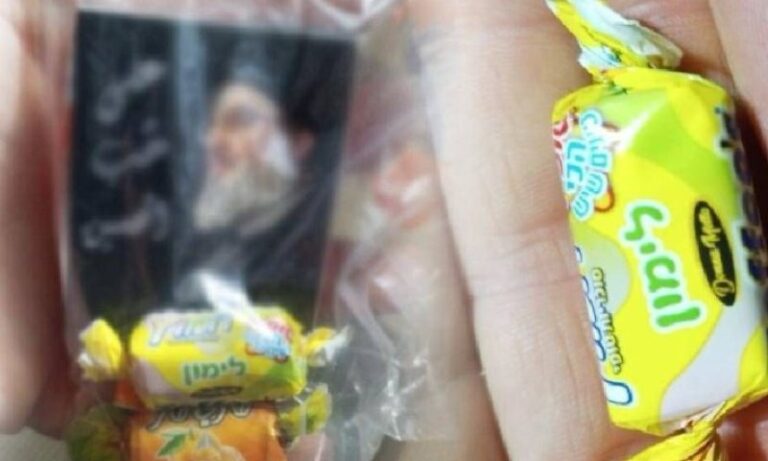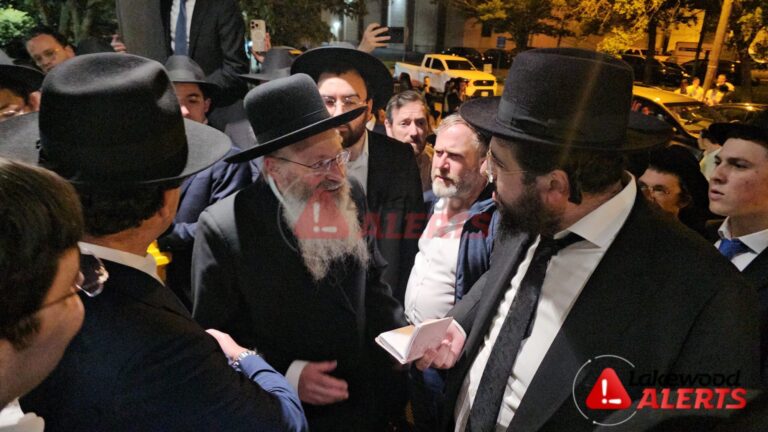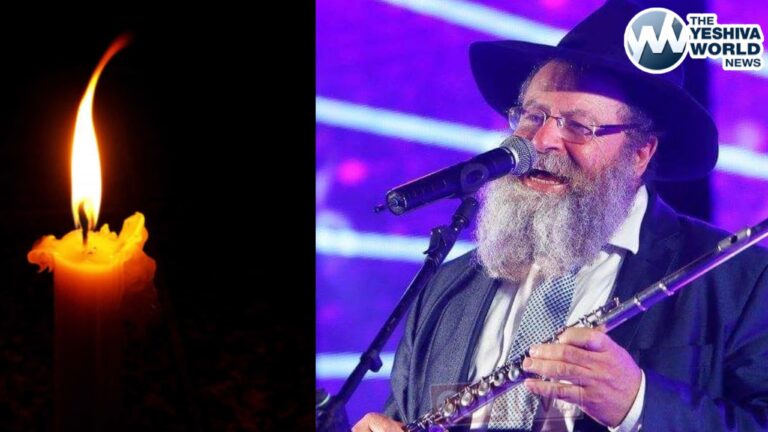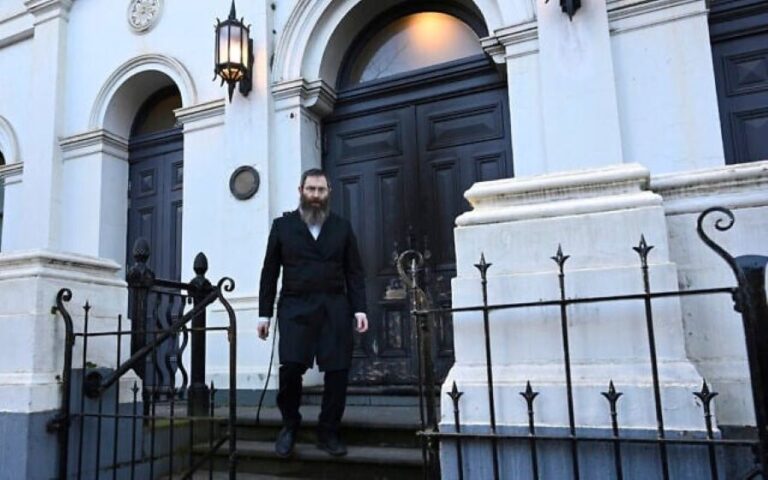ROL: They aren’t asking people to become Orthodox Jews like themselves. For that matter, they don’t like separating members of a common faith into the usual Orthodox, Conservative and Reform camps.
Pesach and Chana Burston just want to produce better Jews.
The Burstons arrived in Orange County two years ago as emissaries of a Hasidic movement known as Chabad-Lubavitch, based in the Crown Heights section of Brooklyn.
For decades, Chabad has dispatched thousands of young, zealous couples like the Burstons all over the world to nurture Judaism wherever it can be found. Their movement is as outward-looking as the Satmar Hasidim of Kiryas Joel are insular. They want to inspire fellow Jews, whatever they call themselves.
While adhering to the strict, literal Judaism of the Hasidim in their own lives, Chabad emissaries – or shlichim – are accommodating toward the assimilated Jews with whom they work.
“Our philosophy is, we’re there to serve Jewish communities, regardless of background,” says Pesach, a 29-year-old rabbi. “Why create barriers and distinctions when people have so much in common?”
In their short time in Orange County, he and his wife have built a dedicated following with their inclusive approach and blur of activities, from Hebrew schools and summer camps to weekly “Kabbalah and Chicken Soup” gatherings at their spacious Monroe home. Celebrations like their Purim party in March can draw upwards of 150 people to the local American Legion hall.
Soon, they could establish an even larger Chabad presence in Orange County. They’re planning a 20,000-square-foot building off Gilbert and High streets in downtown Monroe that would become a permanent home for their expanding activities. It would also hold a synagogue.
Thus far, the only friction the Burstons have encountered is with a rival Chabad group in Goshen, led by Rabbi Yakov Borenstein and his nephew, Meir.
The elder Borenstein, who has represented Chabad in Poughkeepsie for about 20 years, claims he placed his nephew in Goshen to do outreach and that the Burstons are usurpers with no right to the Chabad name. Both groups, the Burstons and the Borensteins, hold similar activities and call themselves Chabad of Orange County.
Occasionally, this otherwise obscure rivalry has spilled into the pages of the Times Herald-Record, where the Borensteins have placed ads asserting their legitimacy and distancing themselves from the Burstons’ building plans in Monroe.
Chabad headquarters sides with the Burstons in this turf battle.
“We are particularly pained that a small, irresponsible group is subjecting the good people of Orange County to unnecessary confusion,” said Zalman Shmotkin, a spokesman for the movement. “The only authorized Chabad-Lubavitch representatives in Orange County are Rabbi Pesach and Chana Burston.”
One February night, guests sit around a dining room table in the Burston home, picking at dried fruits as Pesach lectures about the Jewish holiday of Tu B’Shvat, which celebrates the flowering of Israel’s earliest-blooming trees.
The young rabbi, sitting at the head of the table in a light blue Oxford shirt with the sleeves rolled up, handles his audience with skill: When eyes wander, he ropes listeners back to attention with a joke, a surprising pop-culture reference, an analogy from his own life.
A fire flickers in the fireplace. Guests smile as 3-year-old Duvy Burston scampers into the room in his jammies. Everything in the room radiates warmth.
“The Burstons are wonderful people to be doing outreach work,” Michelle Dixler, one of the guests that evening, says later. “They are warm and friendly. They are nonjudgmental. They have a very welcoming attitude. I feel very comfortable with them.”
The couple came to Orange County in 2004 to establish what is essentially a Chabad franchise. Pesach was from Crown Heights, born and raised there among the Lubavitch Hasidim. Chana was from Buffalo, raised in a non-Orthodox household that embraced Chabad after her father met one of its local rabbis.
Pesach and Chana met while working for separate Chabad organizations in Los Angeles and Beverly Hills, Calif. After testing the waters in Florida, California and Seattle, the Burstons rented a house in Woodbury’s upscale Brigadoon development and began organizing events for local Jews.
The luster of the operation they have developed in that short time – despite minimal financial support from Chabad headquarters – is striking. Their literature is colorful, professional and expensive. Their activities are elaborate and creative.
The Burstons’ success and expansion plans probably cause a twinge of anxiety within Monroe’s Reform and Conservative temples, whose leaders would rather not lose members and donors to Chabad. Some of the couple’s most fervent admirers – those who go to the “Kabbalah and Chicken Soup” dinners and underwrite Chabad holiday parties – belong to Congregation Eitz Chaim and Monroe Temple Beth-El.
The rabbis from those two temples preferred not to speak for publication about Chabad.
The Burstons, for their part, don’t view themselves as competition. They say they deliberately set up programs that weren’t already available.
“We’re not doing anything that we don’t feel is filling a void,” Chana says.
But the large turnout at their gatherings and the comments of their supporters make clear that the Burstons have “repackaged” Judaism, as they put it, in an appealing way for a broad range of Jews, whether affiliated with a temple or not.
“Chabad really knows how to zero in on what really interests people,” says Iris Sandow, whose family belongs to Temple Beth-El but also participates in Chabad events. “It’s easier to relate to Chabad on a spiritual level than the traditional synagogues.”
What is Chabad?Chabad-Lubavitch is a large movement of Hasidic Jews that originated in the Belarus town of Lubavitch in the late 18th century. “Chabad” is a Hebrew acronym that means wisdom, understanding and knowledge.Often called just Chabad or Lubavitch, the movement is based in the Crown Heights section of Brooklyn and is known for its aggressive outreach, a campaign waged by young couples dispatched around the world as emissaries or shlichim. There are more than 4,000 emissary families worldwide, working in places as unlikely as the Congo. The organization estimates that nearly 1 million children attend Chabad schools, camps and holiday programs.Since its last rebbe, Menachem Mendel Schneerson, died in 1994, the movement has splintered over one faction’s insistence that Schneerson was the Messiah.










